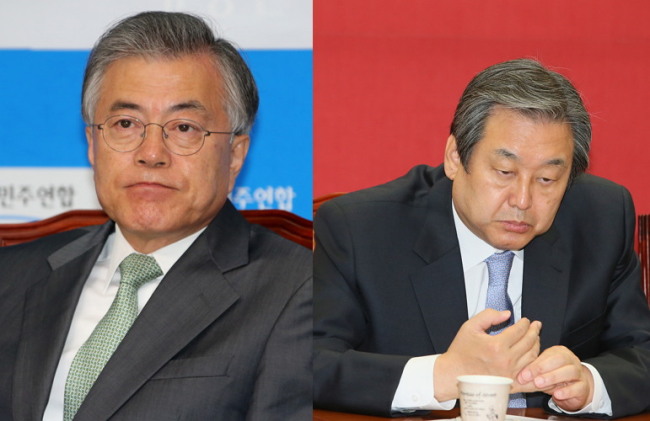The April 29 by-election held to fill four parliamentary seats on Wednesday is expected to set limited but new direction for rival parties as they strive to take an advantageous position ahead of the general election next year.
Voters headed to polling stations in four constituencies — in Seoul, Incheon, Gwangju and Seongnam of Gyeonggi Province — to pick lawmakers for the 300-member National Assembly.
The election, dubbed as “ultra mini-general election,” would not have significant impact in changing the current political landscape, pundits said. But the winner of the election is expected to take a lead in the partisan fight over the escalating graft scandal and in ongoing discussions over pending issues such as pension and labor reform.

NPAD leader Moon Jae-in and Saenuri leader Kim Moo-sung
Saenuri leader Kim Moo-sung urged voters to pick the party’s candidates, stressing that all the four constituencies need reliable support from the governing party.
“To achieve regional development, we need a talented lawmaker and above all, the power of the governing party,” he said during a supreme council meeting.
Opposition leader Moon Jae-in, on the contrary, urged voters to give a referendum on the scandal-stricken Park Geun-hye administration through the by-election. Park and the Saenuri Party have come under criticism over a graft scandal involving her close confidants.
“Only votes can give an answer to the Park Geun-hye administration’s failed economic policies, personnel appointment and corruption,” he said at a meeting.
Analysts said the election is crucial for leaders of the rival parties, as it is their first major test.
The outcome could also help parties take a lead in the escalating partisan fight over the graft scandal. A Saenuri win, for instance, would minimize the damage from the scandal while the victory of New Politics Alliance for Democracy would help the party intensify attacks against the ruling party and President Park, they said.
The snowballing graft scandal involving President Park’s key aides has set up a favorable environment for the main opposition party ahead of the election, said a Seoul-based political analyst Yoon Hee-woong. But it is difficult to say that the scandal would serve as a winning factor for NPAD in the election, he said, citing systematic limitation of the mini election.
As of 3 p.m. voter turnout stood at 26.5 percent, 1.7 percentage points higher than last year’s by-election. But the slight changes in the turnout has little to do with the number of liberal voters aged between 20s and 40s — crucial groups for the opposition party — as many of them won’t be able to make it to the polling stations because of their jobs.
Yoon Pyeong-joon, political professor of Hanshin University, also played down the impact of the election, stressing that it doesn’t have any of decisive factors expected to bring changes in political landscape.
“I don’t think the election would become a barometer of public sentiment. The scale of the election in which parties are competing with each other for four (out of 300 parliamentary) seats is not big enough to have an impact,” he said
Yoon also said it was difficult to determine who will be the victor in the race, highlighting that the public sentiment is in a state of flux.
“The election is taking place with complex feelings toward the Park (administration) conflicting together,” he said.
Park continued to show her authoritative leadership through a message announced on Tuesday, Yoon pointed out.
“Park’s counterattack against the opposition party could stimulate liberal voters and further disappoint swinging voters who may have wanted to see her taking the responsibility over burgeoning graft scandal involving her close confidants,” he said.
“But at the same time, her illness caused by overwork, could garner more sympathy votes from conservative voters.”
By Cho Chung-un (
christory@heraldcorp.com)



![[KH Explains] No more 'Michael' at Kakao Games](http://res.heraldm.com/phpwas/restmb_idxmake.php?idx=645&simg=/content/image/2024/04/28/20240428050183_0.jpg&u=20240428180321)


